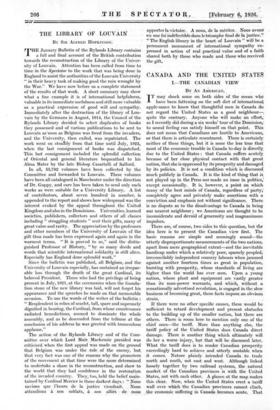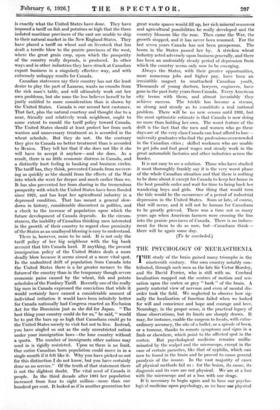CANADA AND THE UNITED STATES
I.—THE CANADIAN VIEW BY AN AMERICAN.
IT may shock some on both sides of the ocean whd have been fattening on the soft diet of international, apple-sauce to know that thoughtful men in Canada do, not regard the United States as a good neighbour-7t quite the contrary.. Anyone who will make an effort; as I recently did during a six weeks' tour of the Dominion,' to sound feeling can satisfy himself on that point. This, does not mean that Canadians are hostile to Americans,; or that there is articulate resentment. There is certainly, neither of these things, but it is none the less true that most of the economic trouble in Canada to-day is directly due to the United States : that Canada suffers acutely, because of her close physical contact with that great nation, that she is oppressed by its prosperity and damaged l by its policies. It is not a condition which is discussed much publicly in Canada. It is the kind of thing that is not played up in the Press nor made all issue in politics,i except occasionally. It is, however, a point on which many of the best minds of Canada, regardless of party,' completely agree and privately make assertions with a conviction and emphasis not without significance. There is no dispute as to the disadvantage to Canada in being our nearest neighbour ; we Americans are thought to be inconsiderate and devoid of generosity and magnanimous impulses.
There are, of course, two sides to this question, but the idea here is to present the Canadian view first. The basic reasons are simple and seemingly sound—the utterly disproportionate measurements of the two nations, apart from mere geographical extent—and the inevitable handicap under which a relatively poor, sparsely peopled; irreconcilably independent country labours when jammed against another fourteen times as great in population, bursting with prosperity, whose standards of living are higher than the world has ever seen. Upon a young nation, whose plant and equipment are vastly greater than its man-power warrants, and which, without a sensationally advertised revolution, is engaged in the slow business of becoming great, these facts impose an obvious strain.
If there were no other specific causes, these would be sufficient to retard development and present obstacles to the building up of the smaller nation, but there are others. There is room here to mention only one of the chief ones—the tariff. More than anything else, the tariff policy of the United States does Canada direct damage. There is another thing which ultimately will do her a worse injury, but that will be discussed later. What the tariff does is to render Canadian prosperity, exceedingly hard to achieve and utterly unstable when it comes. Nature plainly intended Canada to trade north and south, not east and west. Although • linked loosely together by two railroad systems, the, natural market of the Canadian provinces is with the United States, not with each other. A glance at the map makes this clear. Now, when the United States erect a tariff wall over which the Canadian provinces cannot climb, the economic suffering in Canada becomes acute. That is exactly what the United States have done. They have imposed a tariff on fish and potatoes so high that the three isolated maritime provinces of the east are unable to ship to their natural market in the New England States. They have placed a tariff on wheat and on livestock that has dealt a terrific blow to the prairie provinces of the west; where the great grain crop, upon which the prosperity of the country really depends, is produced. In other ways and in other industries they have struck at Canadian export business in a singularly effective way, and with extremely unhappy results for Canada.
Canadian statesmen say their country has not the least desire to play the part of Lazarus, wants no crumbs from the rich man's table, and will ultimately work out her own problems, but she none the less believes herself to be justly entitled to more consideration than is shown by the United States. Canada is our second best customer. That fact, plus the natural courtesy and thought due to a near, friendly and relatively weak neighbour, ought to some extent to mould the tariff policy toward Canada. The United States should at least protect her from such wanton and unnecessary treatment as is accorded in the wheat schedule. But they do not. On the contrary they give to Canada no better treatment than is accorded to Mexico. They tell her that if she does not like it she will have to accept it anyhow—and she does. As a result, there is no little economic distress in Canada, and a distinctly hurt feeling in banking and business circles. The tariff has, they think, prevented Canada from recover- ing as quickly as she should from the effects of the War into which she went far deeper and much earlier than we It has also prevented her from sharing in the tremendous prosperity with which the United States have been flooded since 1921, and has kept her agricultural industry in a depressed condition. That has meant a general slow- down in history, considerable discontent in politics, and a check to the increase of population upon which the future development of Canada depends. In the circum- stances, the inability of Canadian thinking men interested in the growth of their country to regard close proximity of the States as an unalloyed blessing is easy to understand.
There is, however, more to be said. It is not only the tariff policy of her big neighbour with the big bank account that hits Canada hard. If anything, the present immigration policy of the United States deals a more deadly blow because it seems aimed at a more vital spot. In the undoubted drift of population from Canada into the United States there is a far greater menace to the future of the country than in the temporary though severe economic pains caused' by the wheat, fish and potato schedules of the Fordney Tariff. Recently one of the really big men in Canada expressed the conviction that while it would certainly have caused a considerable amount of individual irritation it would have been infinitely better for Canada nationally had Congress enacted an Exclusion Act for the Dominion just as she did for Japan. " The best thing your country could do for us," he said, " would be to put the bars up so high that Canadians could go to the United States merely to visit but not to live. Instead, you have singled us out as the only unrestricted nation under your immigration laws—the lone country without a quota. The number of immigrants other nations may send in is rigidly restricted. Upon us there is no limit. Our entire 'Canadian born population could move in in a single month if it felt like it. Why' you have picked us out for this distinction I do not know, but you have certainly done us no service." Of the truth of that statement there is not the slightest doubt. The vital need of Canada is people. In the third decade after 1881 her population increased from four to eight million—more than one hundred per cent. It looked as if in another generation her great waste spaces would fill up, her rich mineral resources and agricultural possibilities be really developed and the country blossom like the rose. Then came the War, the growth stopped, and it has never been resumed. For the last seven years Canada has not been prosperous. The boom in the States passed her by. A stricken wheat industry acted adversely upon business generally, and there has been an undeniably steady period of depression from which the country seems only now to be emerging.
Always the States, with their greater opportunities, more numerous jobs and higher pay, have been an irresistible magnet to unattached Canadian youth. Thousands of young doctors, lawyers, engineers, have gone in the past forty years from Canada. Every American city teems with them, and almost invariably they achieve success. The trickle has become a stream, so strong and steady as to constitute a real national problem. There will be no new census until 1931, but the most optimistic estimate is that Canada is now doing no more than holding her own. The worst feature of the drift is the fact that the men and women who go these days are of the very class Canada can least afford to lose— university graduates who find the professions overcrowded in the Canadian cities ; skilled workmen who are unable to get jobs and find good wages and steady work in the great automobile factories and other industries across the border.
It is not easy to see a solution. Those who have studied it most thoroughly frankly say it is the very worst phase of the whole Canadian situation and that there is nothing to be done about it except for Canada to keep her house in the best possible order and wait for time to bring back her wandering boys and girls. One thing that would turn the tide would be the occurrence of a period of industrial depression in the United States. Soon or late, of course, that will occur, and it will not be human for Canadians to be greatly grieved. There was a time not so many years ago when American farmers were crossing the line into the prairie provinces of Canada. There is no induce- ment for them to 'do so now, but—Canadians think— there will be again some day.
(To be concluded.)



























































 Previous page
Previous page